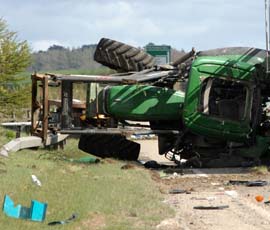Industry unites to produce farm safety charter

A coalition of farm organisations has pledged to improve the safety record of people working in the agricultural sector.
The groups have joined forces to produce a Farm Safety Charter in a bid to raise awareness of the dangers faced when farming and to provide practical advice, training and guidance on how farms can be made safer.
The charter was officially launched at this year’s Grassland and Muck event (May 18).
Although only 1.5% of the workforce are employed in agriculture they account for up to 20% of all fatality of workers, said NFU president Peter Kendall. This is more than the construction industry.
The amount of stories he heard of on-farm tragedies never ceased to amaze him, he said. And while the industry should be striving to be technologically advanced it also had to be safe.
The launch of the charter follows last year’s industry summit which set about finding tangible ways of improving farm safety and reducing deaths and injuries.
A range of farming organisations, including CLA, NFU, LANTRA, Agricultural Industries Confederation and the Tenant Farmers Association, have given their support to the charter. It also has the backing of Farmers Weekly.
All the bodies involved have pledged to raise awareness of the dangers faced when working in the agricultural sector and to provide practical advice, training and guidance on how farms can be made safer.
In 2010, agriculture became, statistically, the most dangerous industry in the country. 455 people have died on British farms in the past decade – that equates to almost one death every week.
Mr Kendall said: “455 deaths on British farms should shock everybody involved in farming. We know this is an unpredictable job and we have to cope with long hours, difficult working conditions and often working alone, but as an industry we must work together to raise awareness and drive these figures down.”
Mr Kendall said that the charter was not trying to send of a message of a “nanny state” but instead, it was about getting the message across about the importance of taking time to consider what people are doing and how they are doing it.
“If there are three things farmers remember it is: take time, stop and think and be careful,” he said.
Judith Hackitt, chair of the Health and Safety Executive she appreciated the industry had unique risks and unique features, such as working long hours and in all weathers, but the risks were manageable.
“We are on a journey to change culture and while it won’t happen overnight and we won’t see an instant dramatic change in results, we are in it for the long haul and improvements will come in due course.”
CLA president William Worsley said it was time to drive down the number of preventable deaths and avoidable accidents by providing practical advice, training and guidance on how farms could be made safer.
“This charter is important because we now have a mandate to bring about a real change in the culture, attitude and behaviour towards farm safety. We are committed to raising awareness of the risks and dangers that affect people working in what are often difficult and unpredictable situations.
“We need to demonstrate that a good safety record is proof of a professional and modern industry, because behind these shocking statistics are the personal tragedies of hundreds of families who have suffered the needless loss of a father or son. We need to do better.”
What does the charter say?
“In 2010, agriculture became the most dangerous industry in the country, based on fatalities per worker. Over the last ten years, 455 people have died on British farms. This equates to almost one death every week. In the same period, 1,700 people were seriously injured on farm.
As leaders of organisations representing agricultural, horticultural, forestry and allied industries, we recognise our responsibilities to show leadership and promote safe systems of work within all sectors of the industry.
We agree on the need to:
• Provide leadership on safety, challenging traditional attitudes to risk.
• Ensure that a regard to safety runs throughout all of the messages we give and the decisions and positions we take on all issues.
• Demonstrate that a good safety record is proof of a professional and modern industry showing that safer working is good business practice.
• Build on the work done over the years by the HSE, using the experience, resource and knowledge base of the HSE to support rather than deliver the messages.
• Work within our own spheres of influence to bring about a change in culture, attitude and behaviour towards farm safety, while coordinating messages and priorities across the industry.
Therefore, we, the undersigned organisations declare that we are committed to working together for a safer farming industry and aspire to consistently reduce the numbers of fatalities and injuries caused to farmers, farm staff and all others who come into contact with farm activities.
We hope that our efforts and commitment to work in partnership with government and other industries and organisations will provide meaningful benefits on tackling farm safety and we strongly encourage others to join us in this endeavour.”
*See more news, pictures and video from Grassland and Muck 2011.grasslandnews
